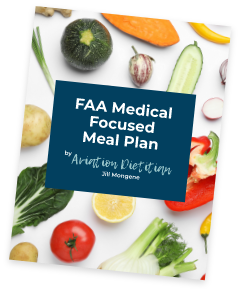How Heart Health Affects Your Aviation Career
Did you know that your nutrition and heart health can have a direct impact on your aviation career? If you are an airline pilot holding a Federal Aviation Administration (FAA) Medical Exam Certificate, maintaining normal blood pressure is important to retain your career. With February being National Heart Month, it’s the perfect time to take a jumpstart on your personal heart health! I can give you the help that you need to improve your heart health and maintain your Federal Aviation Administration (FAA) medical exam certificate.
Why is nutrition important for heart health?
Nutrition plays a multidimensional role in cardiovascular health. It can affect your cholesterol, triglycerides, blood pressure, endothelial function, the lining of your blood vessels, and inflammation. It can even impact your insulin levels and resistance (think Type 2 Diabetes).
Having a heart healthy diet can not only help with those things listed above, but it can also help prevent the development of coronary heart disease, help with weight loss, and reduce your risk of diabetes and high blood pressure. Making heart health a focus of your diet can greatly impact your overall health, not to mention help you maintain your career in aviation.
Why is cholesterol important?
Cholesterol is a fatty substance in your body that is necessary for many metabolic processes. While your body does need cholesterol to help produce and maintain certain hormones, it can make its own. If you eat too much cholesterol , it puts you at higher risk for heart disease. If you maintain a healthy diet, it can help lower your cholesterol to a healthy level.
LDL Cholesterol vs. HDL Cholesterol
LDL cholesterol is often referred to as the “bad” cholesterol, while HDL cholesterol is often referred to as the “good” cholesterol. As an airline pilot, flight attendant
or air traffic controller, you need to know your cholesterol levels. If LDL and/or Triglycerides are high? You need to work toward reducing those numbers. Why? Because it directly affects your blood pressure and “could” cause you
to lose your aviation career or end up with a lifetime of medication.
It is recommended that people with high cholesterol reduce their saturated fat consumption. When reducing consumption of saturated fat, a key factor is what replaces it. It is important to look at the quality of the fats and replace saturated fat in the diet.
It is best to replace saturated fat with unsaturated fats. There is high-quality evidence that for every 1% of saturated fat calories replaced by an unsaturated fat it will lower LDL and Triglycerides by .35 to 2.1 mg/dL.
Here are several simple changes that you can make to help lower your cholesterol.
| Saturated Fat | Unsaturated Fat or less Saturated Fat |
| 3 slices of Bacon | ¼ Avocado |
| 2 TBSP Cream Cheese | 2 TBSP Peanut (or other nut) Butter |
| 1 TBSP Margarine | 1 TBSP Butter or 1 TBSP Olive Oil |
| Regular Ground Beef | Beans (Black, Kidney, Northern or other) |
| Ribeye Steak | Sirloin Steak |
| Regular Ground Beef | 90-95% Lean Ground Beef |
| 2 TBSP Sour Cream | 2 TBSP Full Fat Plain Greek Yogurt |
With higher LDL and Triglyceride levels, you can experience blockage in vessels
which can drive up your blood pressure readings. If you’re an airline pilot holding
a FAA Medical Exam Certificate, you know how important your blood pressure is to retaining your career!
What is blood pressure and how does it work?
Blood pressure is the force of blood pushing against artery walls. It is a combination of two measurements. The top number, systolic pressure, is the pressure in the veins during a heartbeat. The bottom measurement, diastolic pressure, is the pressure
in the veins between heartbeats.
High blood pressure increases the risk for heart attacks, strokes, chronic heart failure, and kidney disease. Long term high blood pressure can also cause other health issues, like a detached retina.
What does the FAA say about blood pressure?
The FAA Examination techniques, Item 55 on blood pressure states
“measurement of blood pressure is an essential part of the FAA medical
certification examination. The average blood pressure while sitting should not exceed 155 mm mercury systolic and 95 mm mercury diastolic maximum pressure
for all classes.”
More information from the FAA on blood pressure
Rather than having to ever use the Hypertension Worksheet, go on medication,
adhere to a special issuance or fail your FAA medical, know that I’ve helped hundreds of airline pilots, aviation mechanics and other related professionals reduce their blood pressure to non-hypertensive levels below 120/80 and I can help you too.
Heart healthy foods that will help you lower
your cholesterol and blood pressure
The key to a heart healthy diet is eating nutrient dense foods. These are several foods that help with heart health by reducing the dilation of blood vessels and removing cholesterol from the body which, in turn, lowers blood pressure.
Sulfur:
Sulfur helps your body metabolize food.
Broccoli, cauliflower, cabbage, kale, brussels sprouts
Magnesium:
Magnesium helps keep your heart in rhythm.
Nuts and seeds
Potassium:
Potassium can help prevent the hardening of arteries.
Watermelon, potatoes, tomatoes
Beta glucan:
Beta glucan helps lower cholesterol.
Oats
Nitric Oxide:
Nitric Oxide is a heart healthy chemical in your blood vessels.
Spinach, romaine lettuce, beets, pomegranate (4oz juice or actual fruit)
Omega 3 Fatty Acids:
Omega 3’s help with your overall heart health by preventing arrhythmia, reducing triglycerides, and slowing the buildup of plaque which can clog your arteries.
Walnuts, chia seeds, ground flax seed
The Bottom Line
To give you your FAA Medical Certification, the AME is going to check your blood pressure. If you do not pass, you may be put on medication or it could impact your career in aviation even further. Now, during American heart month, is the perfect time to jumpstart your heart health.
Working in the aviation industry can make it difficult to maintain a heart healthy, nutritious diet. There is not always access to an abundance of food options, especially on
an airline employee’s schedule, which can be any time of day or night. There are simple changes that you can make with the foods that you do have access to that can make
a huge difference in your heart health.
For a nutritious approach to your heart health and cholesterol, consider signing up
for a 30 minute consultation with me – the first Aviation Dietitian. I am a licensed and credentialed professional who has spent the last 17 years helping others in your field.
Make this year the year to no longer struggle. I have helped hundreds of others like you
lose weight, improve their heart health and feel good in their bodies!









